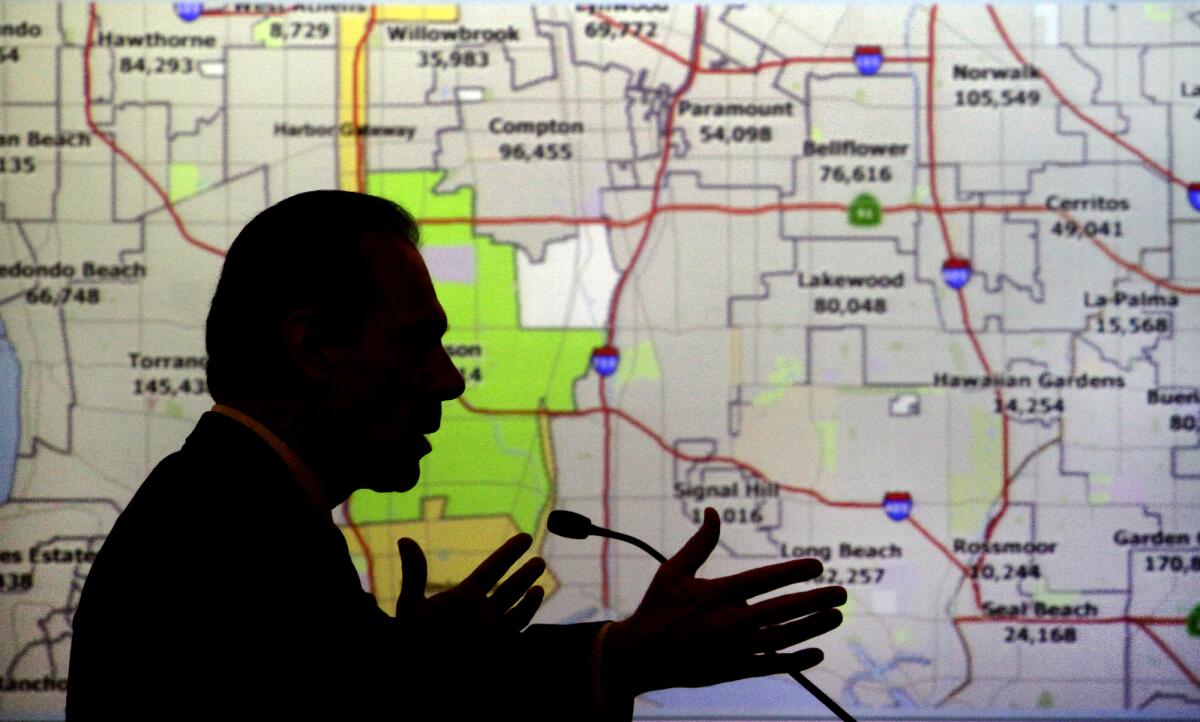Legal challenge to California redistricting seeks document disclosure, new advisors

- Share via
SACRAMENTO — The California Supreme Court has been asked to fire the state independent redistricting commission’s legal advisors and force disclosure of private meetings and research into race-based voting patterns, a legal challenge made as the panel is in the final stages of crafting new political maps.
Harmeet Dhillon, a San Francisco attorney and member of the Republican National Committee, filed the request Tuesday with the state’s highest court on behalf of a group of GOP voters. This week, the California Citizens Redistricting Commission began considering changes to draft maps released last month for the state’s congressional, legislative and Board of Equalization districts.
The commission is expected to certify its maps no later than Dec. 26.
The legal challenge asserts the redistricting commission “is betraying its founding charter” by not disclosing communications “about redistricting matters with interested parties outside of noticed public CRC meetings” and that its outside attorneys have “a vested interest in the voting district boundaries” being created.
Fourteen commissioners — five Democrats, five Republicans and four unaffiliated with a political party — were selected in the summer of 2020 to revise California’s political maps, a process carried out once every decade as new census data become available. The work began months later than expected after the COVID-19 pandemic delayed the completion of the census until August. That, in turn, dramatically reduced the amount of time the commission has to revise the maps before statewide elections in 2022.
Pedro Toledo, a member of the commission who currently serves as its chairman, said Thursday that the legal petition is still being reviewed.
“This Commission’s commitment to transparency has consistently gone far beyond anything required under the law, and the public has consistently praised the Commission for its transparency and responsiveness,” Toledo said in an emailed statement.
The emergency petition filed on behalf of five California voters alleges that individual and small groups of commissioners have met in private with groups seeking to influence the panel’s final actions. Plaintiffs submitted documents obtained through formal records requests that show notes taken during meetings with members of groups that advocate for Latino communities, business interests and government reform efforts.
A Republican legal challenge was launched against California’s redistricting efforts requesting several changes to the ongoing process.
Similar concerns were raised in the spring, highlighted by a sharply worded letter to the commission from Charles Munger Jr., a prominent Republican donor who funded significant portions of the campaign to pass redistricting ballot measures in 2008 and 2010.
“The disclosed notes show that CRC commissioners were meeting with interested parties to discuss redistricting matters outside the CRC meetings and without making a public record of the meetings,” the legal filing states. “There was thus no public notice and opportunity to participate, comment upon, or know what was discussed, or even that a discussion took place.”
Public input is often cited as a key component of redistricting, as communities have urged the panel’s members not to separate some regions in drawing new lines for representation in Washington and Sacramento. Local support for a single congressional district for most of San Joaquin County, for example, may have helped guide the commission’s decision to change early sketches of the area before issuing draft maps last month.
Plaintiffs in the case also asked the court to compel the redistricting commission to release a private report analyzing historic racial voting patterns in some parts of California, an important building block in drawing maps that comply with the federal Voting Rights Act. The report was prepared by consultants hired by the commission and, while frequently referenced in recent meetings, has not been released to the public.
The draft congressional and legislative maps were posted online with information regarding each district’s voting-age population by race and ethnicity. But the underlying reasons for why certain California communities would be divvied up with those voters in mind — reasons presumably guided by the study of past voting trends that split along racial lines — remain unclear.
Perhaps the most far-reaching demand made to the California Supreme Court in Tuesday’s filing is for the redistricting commission to fire Strumwasser & Woocher, a Los Angeles-based law firm that has served as counsel to leaders of the state Legislature. The firm’s website also cites its work for the campaigns of former President Obama in 2008 and 2012.
“The CRC is not only violating its constitutionally mandated independence by sharing an incurably conflicted counsel with the Legislature,” the legal filing argues, “it is also using its relationship with that firm — on the advice of that firm — to conceal the influential voting district analyses from public oversight, in violation of the law creating the CRC.”
Representatives of Strumwasser & Woocher signed a contract with state officials in May, an agreement that assigns the firm the task of writing the commission’s final report that will detail how the maps — covering 52 congressional districts, 120 legislative districts and four state Board of Equalization districts — comply with the federal Voting Rights Act. The contract also included provisions related to the need for the attorneys assigned to the commission to not discuss the work with anyone at the firm “engaged in lobbying involving redistricting issues.”
Should the state Supreme Court agree with any or all of the requests made in Tuesday’s legal filing, the justices could be forced to also adjust the timeline for final certification of California’s new maps. The court rejected the redistricting commission’s request this summer to extend the work period, after warnings by elections officials that preparations for the June 2022 statewide primary would be jeopardized by a delay in drafting new political maps.
More to Read
Sign up for Essential California
The most important California stories and recommendations in your inbox every morning.
You may occasionally receive promotional content from the Los Angeles Times.














